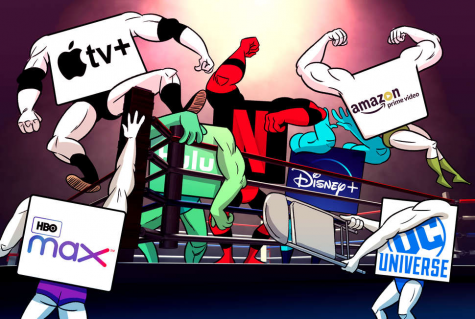The impact of modern music: does it hold up to previous standards?
What happened to the value and sentiment music once had?
VIRGINIA BEACH – If someone were to ask who the most influential musicians of all time are, what would come to mind? The Beatles? Madonna? Bob Marley? Now, besides the fact that these artists were popular over 40 years ago, they all have a couple of very important aspects in common. First and foremost, these groups of musicians were all widely regarded as the forefront of their specific genre. The Beatles are considered by many to be one of the founders of rock and roll, as well as early pioneers of pop music. They revolutionized marketed music and paved the way for thousands of successful musicians today. Madonna, the 80s-beloved pop icon, is still known as the best-selling female artist of all time. She impacted women all over the world by giving them a sense of empowerment, proving that style isn’t objective and that girls everywhere could follow their own passions. Bob Marley, who introduced the creation of reggae music, demonstrated that music is not created solely for entertainment. During his time of fame during periods of intense struggle and war throughout the world, Marley created intricate tunes that spoke out against racism and discrimination, as well as embracing peace and loving your fellow humans.
Additionally, these artists used their music to reach out to a wide audience and advocate for change. The value of these artists not only comes from their breakthrough ideas and revolutionary lifestyles, but also from the messages of their music. Some of the most influential songs in history are written as messages to the public to question the state of the world around them. To name a few, Bob Dylan’s ‘Like a Rolling Stone’ focuses on the never-ending search for freedom in a place with sometimes critical social norms. Marvin Gaye’s ‘What’s Going On?’ explores the harsh realities of drug abuse and social injustice, especially during the Vietnam War. One of the most famous examples is John Lennon’s ‘Imagine’, in which a theoretical utopia could be reached if violence and conformity were to end (although the latter was seen by as many as radical). The effects of these artists, among others in their respective time frames, are seen by many as unparalleled in today’s state of music.
Flash forward a couple of decades, where artists such as Kanye West, Rihanna and Billie Eilish are taking the music world by storm. At 18 years old, Billie Eilish recorded her debut album, WHEN WE ALL FALL ASLEEP, WHERE DO WE GO?, in her parents’ basement with her brother Finneas O’Connell using a laptop and a basic recording setup. After its release on March 29, 2019, it won 5 Grammys at the 2020 awards ceremony. Many praise Eilish’s whispering vocal technique and dark, poppy instrumentals as the reason behind her success, as well as her subject matter. Her songs about drug abuse, depression, and the susceptibility of modern youth resonate with millions of teenagers around the world that listen to her. In an interview with New Music Enterprise, Billie’s brother Finneas was asked about ‘Xanny’, a very powerful track on the record-breaking album. He claimed he wanted “…[the song] to feel jarring. It was a calculated imitation of inexperienced music production”. O’Connell further vented about the “SoundCloud rap which is made quite carelessly”, taking a jab at the style of music that has gained popularity exponentially in recent years. The process of ‘SoundCloud rapping’, also regarded as mumble rapping, typically involves a younger artist freestyling over a looped beat for a short period of time, common themes being drug use, violence and suicide.
Another aspect of modern music that sharply contrasts the legendary songs of years ago is the fact that modern music can become famous in a matter of days. Streaming sites like Spotify and Apple Music, as well as apps like TikTok, allow artists to put their songs online and let people spread them around, meaning a song could reach millions of people in a few hours. Matt McGraw, a junior at Cape Henry, was asked for his thoughts on this drastic change, coming from a musician’s standpoint. McGraw stated his hesitance, claiming that “…it’s a bit annoying how pretty much anyone can become famous with their music. From what [he’s] seen, a song could be poorly made but other factors go into fame, such as attractiveness and age. Talent doesn’t really seem to be the basis behind ‘good’ music anymore”. Musicians, especially those operating on a professional level, tend to have different standpoints on the influence of modern music for different reasons. It is evident that the creation of widespread music does not take the amount of time and talent as it once did, and perhaps this is one of the factors that tie into the decaying value and sentiment of music.
Compared to music created decades ago, it seems as if modern music fails to influence masses to the degree that it used to. Some may argue that the innovation and new ideas that were brought on early in music’s history may have suppressed the spark that is excitement in music. The big question stands: are artists able to release songs that hold significance to a broad audience anymore? To many, this claim seems unbelievably false, but chances are that the answer to the question is not as likely to be yes. Hundreds of years ago, composers could create popular symphonies and concertos with amazing levels of complexity that were still able to appeal to a large audience. Then, jazz artists started to emerge and trailblaze the path of complex music. Originally, jazz was an African-American style that spurred from the blues and was used as a political outlet and means to eliminate class barriers. When it spread from New Orleans to the rest of America and became engraved into its culture, artists like Bing Crosby and Frank Sinatra played a similar style while winning over audiences with their charm. Then came along the Beatles, the Beach Boys, Elvis Presley, musicians that took a different approach. The complexity of music seemed to dwindle down a bit, as these famous groups would win over audiences with melodies that were easy to sing and dance to, that could be repeated by fans over and over.
During this period, the so-called ‘pop formula’ was developed and is what is present in nearly every pop song to this day. Underneath the massive influence of popular bands from the 70s and 80s was a very simple fact: simplicity is better. In terms of pleasing audiences, the majority of fans want to hear a song they can sing and remember. According to a study conducted by a scientific journal known as PLOS One, researchers contend that “…the instrumentational uniformity of a style decreases, i.e. a unique stylistic and increasingly complex expression pattern emerges. In contrast, album sales of a given style typically increase with decreasing instrumentational complexity. This can be interpreted as music becoming increasingly formulaic in terms of instrumentation once commercial or mainstream success sets in.” Basically, simpler music attracts more listeners. The study also demonstrates that more complex music genres tend to push listeners away from the genre.
Nowadays, it seems that the formula for success is a four-chord song and catchy lyrics, which is the main attraction of a large audience. The barebones of this claim lie in the fact that creating music to attract an audience does not make it significant. So while the Billboard Top 100 Songs list is filled with songs about sex, drugs and alcohol, it becomes apparent that familiarity contradicts innovation, which as a result lessens the value of modern music.
Obviously, music is subjective. While there is a reason people love pop and rap songs, there are also people who shy away from those genres and listen to other styles. With this in mind, could it be possible that the wide variety of music heard today produces a divide between listeners, taking away from the sentiment of music? Maybe. Some believe that music in the past couple of years has turned into a valueless commodity, from an economic standpoint. Music used to be regarded as having to go into a record store to purchase an album or buy a CD. Whereas in the present, streaming platforms like Spotify and Pandora allow users to hear millions of songs for free. While this in itself could be a factor for the lowering value of music, it still holds true that music is valued the same psychologically. Compared to earlier years where there were not nearly as many bands that had similar levels of popularity, genres today are split in terms of success and the number of listeners.
In what has become a race for success, many musicians have evidently lost the incentive to create passionate music for the sake of making music. On one hand, someone could argue that record labels have always been changing bands’ genres and styles to greater appeal to their audiences. Nevertheless, labels have plentiful resources and knowledge to predict what song will become a breakout hit next, a startling but verified fact that has only recently been used. Using the previously mentioned ‘pop formula’ and other programs, these industries can take upcoming artists and release them to an audience of hundreds of millions of people. Doesn’t this seem like a good thing? The sad truth is that wealthy corporations within the music industry aim to create big-time names to further boost their success, using Clear Channel’s On the Verge as an example. Clear Channel, now recognized as iHeartMedia, owns many of the most popular FM radio stations. When they dub a new artist’s song ‘On the Verge’, these stations have to play it at least 150 times, which broadcasts it to a network of about 245 million listeners. This process is seen as cheap by some people, including Cape Henry senior Ben Scott. Scott stated that he “…disagrees with this, as it takes away from the dedication of becoming famous.” The senior also recognized that while this may be a handicap and a kickstart for upcoming artists, “…all it does is promote the same songs over and over to the same people”, explaining his disregard for the style of music that churns through the biggest radio stations.
One other issue that has created an apparent divide between fans of music is gatekeeping. Especially popular among lesser-known genres, gatekeeping is when ‘hardcore’ fans of certain genres or bands criticize people for not sharing the same level of passion as they do. For example, if you’re wearing a Nirvana shirt since you like the band, that seems perfectly fine. That is, until somebody comes and asks you if you like Nirvana, then proceeds to ask you to name every song off of every album. If you can’t, you are not a ‘true fan’. By disallowing people to enjoy different genres of music, music elitists cause a rift between them and people who are just trying to enjoy music. Since when has music been a competition? Does it matter if the music you listen to is ‘better’ than the rest? Sorry to say, but your preferred band may not be appreciated by the masses like those sappy three-chord songs you’re so against. As a result, this constant argument shows signs of devaluing music. Compared to 40 years ago, it is a lot easier to be picky today with music, as virtually every song is accessible to the general public. One doesn’t have to be selective with their music choice, as seen earlier where albums and CDs could only be purchased in stores. Additionally, the economic value of music increasing potentially means the decreasing sentimental value, proving the initial statement that modern music does not hold the same value as older music.
There is no question that music has evolved significantly over time, regardless of whether people think that is a good or bad thing. Studies have shown that modern styles of music have grown simpler and more repetitive to appeal to a larger audience. Evidence is also present that some see music as an economic contest, which takes away from the true value and sentiment of music. Obviously, there are still songs being written today that advocate change and inspire people by the millions, but in a different manner from the 60s and 70s. The changed mindset is seen through the evolution of bands like the Beatles to artists like Billie Eilish. At the end of the day, the subjectivity of music leads some to believe that modern music degrades its ancestors, while others believe that it holds just as much value as music before its time.


